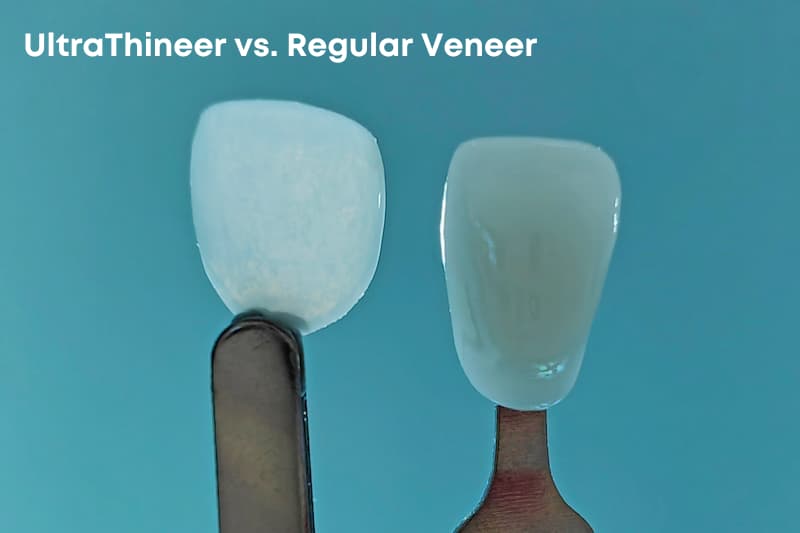BMF Gets FDA Clearance for UltraThineer Veneer Material
The company says material will be used to create the world’s thinnest cosmetic veneers, and will require less tooth prep.
BMF Gets FDA Clearance for UltraThineer Veneer Material | Image Credit: © Boston Micro Fabrication

What’s being called the world’s thinnest veneer just cleared a big hurdle to being used as cosmetic dental veneers.
Boston Micro Fabrication (BMF) announced on Monday that it has received U.S. Food and Drug Administration (FDA) 510(k) clearance for its innovative UltraThineer™ material. The material is used to create what the company says is the world’s thinnest veneer.
The new 3D-printed veneers use projection micro stereolithography (PµSL) technology that allows for greater resolution, accuracy and precision to custom-manufacture veneers that are 3 times thinner than traditional veneers. Additionally, UltraThineer is said to require significantly less preparation for dental professionals, allowing preservation of the patient’s original enamel with a more realistic final appearance.
"We are thrilled to hear that the UltraThineer veneer has received FDA 510(k) clearance. This is a significant milestone for our industry as having the ability to 3D print veneers in zirconia is a game changer for dental technology,” Dany Karam, president of Advanced Dental Technologies, a full-service dental laboratory in Stoneham, Massachusetts, says in a press release. “This breakthrough allows us to offer patients high quality veneers that require minimum prepping. This is just the beginning of our journey to revolutionize dental care, and we look forward to working with BMF to begin offering the UltraThineer to dental patients across the country.”
Developed in collaboration with Peking University, dental labs can now offer this precise alternative to traditional veneers for dental practices across the U.S., powered by BMF’s unique, micro-scale printing technology. UltraThineer veneers feature advanced material, a production workflow, and the finishing process designed to deliver more comfortable and less invasive options in cosmetic dentistry.
3D printing is already commonly used for other dental applications including orthodontic aligners, mouth guards, drill guides, and dentures as this additive manufacturing process can meet the need for on-demand, personalized, and custom solutions.
“After refining this process, technology and material for the last year, we’re incredibly encouraged by the FDA’s expedient review of the UltraThineer material so we can quickly bring it to consumers looking for a more streamlined veneer solution,” adds ProfessorSun Yuchun, Peking University School of Stomatology, in the press release. “With the same durability as traditional veneers, dental labs across the U.S. can now deliver an improved veneer option that isn’t as invasive for the patient, minimizing tooth reduction and improving the overall appearance of teeth.”
BMF has begun to partner with dental labs throughout the country and expects to have the products commercially available in the second half of 2024, the company states. The UItraThineer material represents the latest innovation delivered by the Massachusetts business. The company continues to explore and establish new applications where its technology can reduce production time and cost.
“We’ve continued to innovate our solutions and explore end-use applications that can be uniquely enabled by the PµSL process in dentistry and the life sciences. We are very pleased with our recent 510(k) clearance and the progress we’ve made towards commercializing this technology to offer more options for patients considering cosmetic dentistry,” states John Kawola, CEO-Global, BMF.
BMF also is developing complementary cosmetic dentistry offerings in international markets to support both direct-to-patient and provider-enabled access to thinner veneers. Venust is the consumer cosmetic dentistry solution available in China (www.venust.cn).
BMF enables precise, micro-scale 3D printing across healthcare, the life sciences, electronics, and machining industries. The microArch system printers are designed to produce accurate and precise high-resolution 3D prints for product development, research, and industrial short run production.
Product Bites – November 10, 2023
November 10th 2023The weekly new products podcast from Dental Products Report is back. With a quick look at all of the newest dental product launches, Product Bites makes sure you don't miss the next innovation for your practice. This week's Product Bites podcast features new launches from Amann Girrbach, DMG, Pac-Dent, and ASI Dental Specialties. [4 Minutes]
Formlabs’ Premium Teeth Resin Garners FDA 510(k) Clearance for Temporary Crowns and Bridges
August 7th 2024With this FDA 510(k) Medical Device Clearance, dental professionals in the U.S. can now use Premium Teeth Resin to 3D print temporary single units and up to seven-unit temporary bridges, as the company expands its dental 3D printing application.